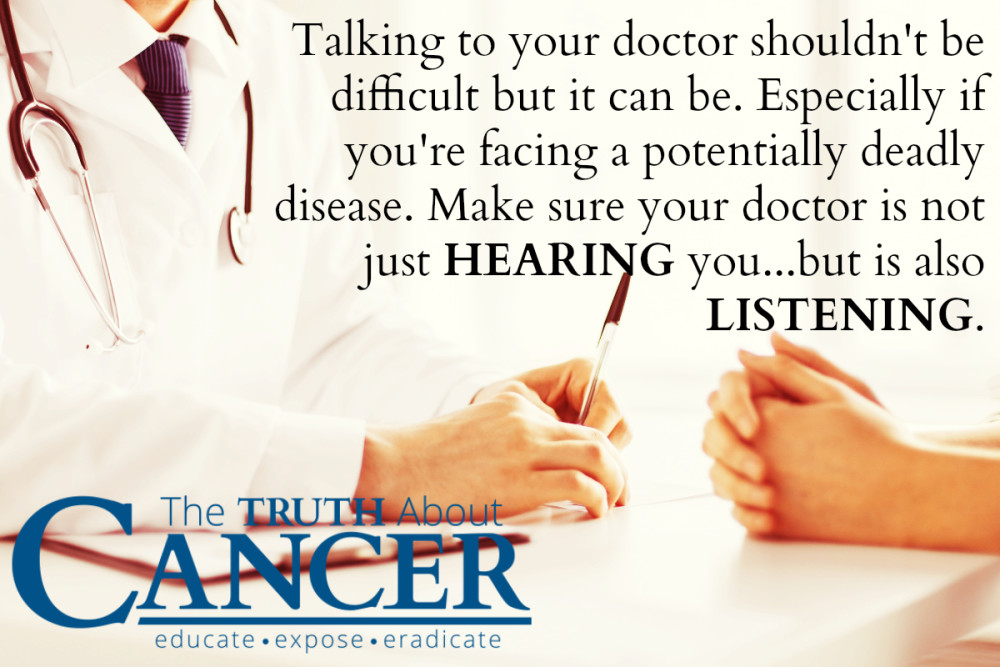When you’re given a negative medical diagnosis – particularly a chronic or potentially fatal disease – you are forced to absorb a massive amount of new information quickly. Processing instructions for your care, jargon, and unfamiliar terminology can be overwhelming.
If you aren’t able to talk to your doctor effectively about your questions and concerns, then you’re forced to blindly trust someone you don’t really know to make your medical decisions.
This can add more stress at a time when you’re already dazed and frightened.
A poor diagnosis is always upsetting, but cancer patients face a different set of challenges. The raging fear and anxiety attached to the mere word “cancer” mean there is no doubt about the seriousness of the situation. It isn’t an obscure disease that no one has ever encountered. Most everyone knows someone who has either fought cancer and/or died from cancer.
Numbing terror means open and trusting communication is incredibly important between a cancer patient and medical personnel.
Dealing with the Chaos of a Cancer Diagnosis
Whether you’re pursuing conventional or alternative therapies, a cancer patient navigates a maze of different doctors, nurses, specialists, and surgeons from day one. Treatment has to be organized. Medicine is often prescribed and needs to be administered. Surgeries are sometimes recommended with a long recovery period to follow. What do you need to know about your health insurance coverage and how will you manage time off work?
In the meantime, daily life continues as always. How in the world does a cancer patient manage?
Taking the reins of your own health management is paramount to maintaining control over the chaos that is cancer treatment. It all begins during your first talk with your doctor about your diagnosis and his or her thoughts on your prognosis.
Communication is the Key for Cancer Patients
Honesty during this first conversation cannot be stressed enough. You have to talk about everything, all of your habits, even the poor ones like smoking or drinking that you might not wish to share. Withholding information at this stage can drastically affect the outcome of your cancer treatment protocol.
Don’t answer your doctor’s questions with a simple yes or no. Give a full explanation.
For example, if the doctor asks whether your stomach hurts, you might say, “Yes, I woke up today and it was fine but as the day progressed it went from an ache to a stabbing pain (point to pain) right here.”
It’s important to offer as much information as possible so a doctor doesn’t have to try to pry all the details out of you or (even worse) assume they understand and make choices based on what could turn out to be wrong information.
Communication is a two-way street.
You need to trust those that are providing your care. If you can’t talk to your doctor, you won’t build trust. You need time to ask your questions and have them answered thoroughly. Your concerns should be taken into account and addressed.
If there is a team of people seeing to your treatments, choose one with whom to build a rapport. This is usually best with the doctor you’ll be seeing most often. Make sure you have an excellent grasp of each level of care you can expect to receive and why. If the doctor interrupts you, gently interrupt them in return until they provide an explanation you understand.
During the rush of many medical appointments, you might forget what you want to ask so write your questions down before your visit. If you have questions about holistic, alternative, or complimentary options, ask them and require valid answers.
What Do You Need as a Cancer Patient?
Some cancer patients need explicit details as well as the pros and cons of each decision to make. Others prefer a more streamlined approach and leave the details to the medical staff. This may be a personal preference or it may be due to confusion or anxiety.
Each case is unique just as each cancer patient is unique. It’s up to you to determine early on how much information you want to receive. Then inform your doctor or team of your wishes. Every team member needs to know how involved you want to be at every level.
Once you decide how much you want to know, you may wish to enlist the help of a friend or family member to be with you throughout the process. Someone who can listen and make notes when doctors explain protocol and treatment options. If you are confused or unclear, there is another person who can help understand or ask questions you may have forgotten or didn’t consider.
It is a good idea to have assistance when navigating medications, appointments, treatments, and at-home protocols. Having a companion during this process may have a calming effect that enables you to focus on your health.
Do You Need a Second Opinion for a Cancer Diagnosis?
Before treatment begins, you may want to ask about a second opinion.
What would your doctor do in your place? Is a second opinion a good idea? Will they recommend someone? If you ask your doctor for an honest opinion and they become defensive, it may be a red flag that a second (and possibly third) opinion is a very good idea.
Doctors who are on your side will understand your concerns and not take this personally. Do your research; it’s your body and your cancer. Trust your instincts and listen to what your inner voice is telling you. Even if the second opinion is identical to the first, you’ve done your due diligence and can confidently begin treatment. If the diagnosis and treatment plan differs, you have cause to seek a third opinion.
When Communication Between a Cancer Patient and Doctor Fails
What happens if you’ve tried to talk to your doctor and you still don’t believe he or she is listening? Cancer patients sometimes forget doctors are human.
Sit with your doctor and be specific about how you feel. Explain your concerns and why you’re troubled. If you need more time to discuss something, tell them exactly what you require and offer to schedule another appointment to do so. If you require more details, stop and tell them before they move on or you may forget.
You may be able to discuss your treatment with a nurse or physician’s assistant. They may act as a third party when you aren’t comfortable going to the doctor.
Hostility has no place during these discussions, from you or your doctor. Be honest and clear about your needs, not accusatory and argumentative. Your doctor should do the same.
During the protocols for cancer treatment, you have a right for those in charge of your care to act in your best interest. You are in control.
If your doctor forces treatment you don’t agree with, won’t answer questions fully, or is essentially bullying you into following their protocol, you need to find another doctor.
This is your life.
You have the right to talk to your doctor with respect and mutual understanding and receive the same in turn. Ultimately, every step to recovery depends upon you.




















I have watched the Videos of Ty Bollinger and am needing to ask him some questions. I have lung cancer and have been treating it medically for a year. It is now coming back. I need other treatment sources to fight this and want to know where to start.
Miryam,
The best advice we can give you is to consult with one of the doctors/experts that we interviewed in our Global Quest Series. Here is a link to get their information: https://thetruthaboutcancer.com/experts-info-sheet/
Also, if you want to send a message to Ty please send it to our customer success team through here: https://support.thetruthaboutcancer.com/submit_ticket
Best wishes!
Valuable information and post. It is important to know that you can insure yourself to decrease and minimalize financial burden for yourself and your family. I have bought life insurance for cancer patients from NoMedicalLifeInsurance, which gave me opportunity to buy it quickly, without spending time for an medical exam. There are many valuable details, which you can find out further.
Probably the most sensible article I’ve read.. My daughter’s smoothie recipe has reversed my PSA reading from 32 to 25, but the best part is I feel better, skin looks better, toxins have left, and I’m regaining control of bowels & urine. ,
That’s great to hear, Chester! Feel free to share your daughter’s smoothie recipe if you would like to. 🙂
We are all bullied into the medical system in having to do mammograms and taking conventional treatments and we do not feel comfortable in doing it.
Non conventional treatments are so expensive and are hard to find, insurance doesn’t pay for them….I would like to know how people can afford them